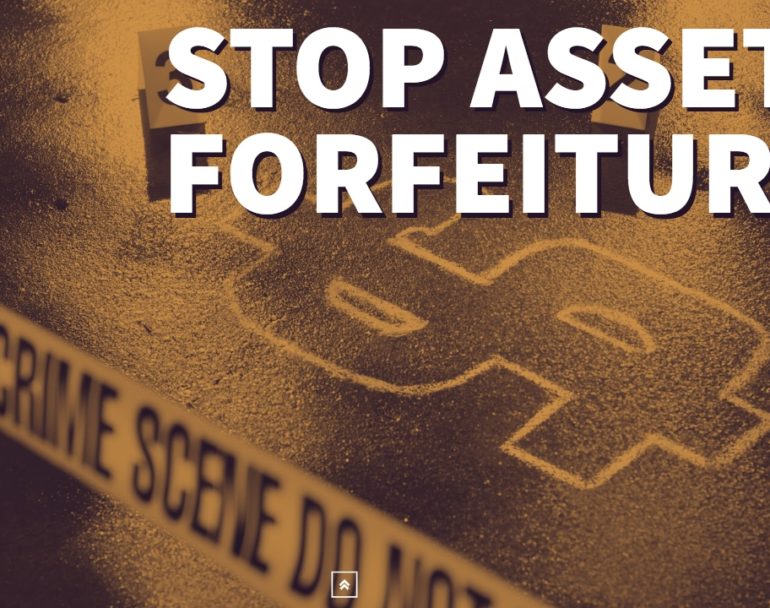
Minnesota Committee Passes Bill to Reform Asset Forfeiture Laws, Opt Out of Federal Equitable Sharing Program
By: Mike Maharrey
ST PAUL, Minn. (March 27, 2019) – A bill moving through the Minnesota House would reform the state’s asset forfeiture laws to require a criminal conviction in most cases and close a loophole allowing state and local police to circumvent the more stringent state asset forfeiture process by passing cases off to the feds.
A bipartisan coalition of representatives introduced House Bill 1971 (HF1971) on March 4. The legislation would effectively end civil asset forfeiture in the state and replace it with a criminal procedure. Under the proposed law, prosecutors would not be able to move forward with asset forfeiture proceedings without first obtaining a criminal conviction in most cases.
HF1971 also addresses the policing for profit motive inherent in the current forfeiture process. Under the proposed law, forfeiture proceeds would be deposited in the state’s general fund after payment of certain expenses. Under the current law, law enforcement agencies keep up to 90 percent of forfeiture proceeds in most cases.
On March 13, the Judiciary Finance and Civil Law Division Committee approved HF1971.
A companion bill (SF2155) was introduced in the Senate on March 7.
NECESSARY
While some people believe the Supreme Court “ended asset forfeiture,” the recent opinion in Timbs v. Indiana ended nothing. Without further action, civil asset forfeiture remains. Additionally, as law professor Ilya Somin noted, the Court left an important issue unresolved. What exactly counts as an “excessive” in the civil forfeiture context?
“That is likely to be a hotly contested issue in the lower federal courts over the next few years. The ultimate effect of today’s decision depends in large part on how that question is resolved. If courts rule that only a few unusually extreme cases qualify as excessive, the impact of Timbs might be relatively marginal.”
Going forward, opponents of civil asset forfeiture could wait and see how lower federal courts will address this “over the next few years,” or they can do what a number of states have already taken steps to do, end the practice on a state level, and opt out of the federal equitable sharing program as well.
FEDERAL LOOPHOLE
Passage of HF1971/SF2155 would take a big step toward closing a loophole that allows state and local police to get around more strict state asset forfeiture laws in a vast majority of situations. This is particularly important in light of a policy directive issued in July 2017 by then-Attorney General Jeff Sessions for the Department of Justice (DOJ).
A federal program known as “Equitable Sharing” allows prosecutors to bypass more stringent state asset forfeiture laws by passing cases off to the federal government through a process known as adoption. The DOJ directive reiterates full support for the equitable sharing program, directs federal law enforcement agencies to aggressively utilize it, and sets the stage to expand it in the future.
Law enforcement agencies can circumvent more strict state forfeiture laws by claiming cases are federal in nature. Under these arrangements, state officials simply hand cases over to a federal agency, participate in the case, and then receive up to 80 percent of the proceeds. However, when states merely withdraw from participation, the federal directive loses its impact.
Until recently, California faced this situation. The state has some of the strongest state-level restrictions on civil asset forfeiture in the country, but state and local police were circumventing the state process by passing cases to the feds. According to a report by the Institute for Justice, Policing for Profit, California ranked as the worst offender of all states in the country between 2000 and 2013. In other words, California law enforcement was passing off a lot of cases to the feds and collecting the loot. The state closed the loophole in 2016.
HF1971/SF2155 features language to close the loophole in most situations.
A local, county, or state law enforcement agency shall not refer, transfer, or otherwise relinquish possession of property seized under state law to a federal agency by way of adoption of the seized property or other means by the federal agency for the purpose of the property’s forfeiture under the federal Controlled Substances Act, United States Code, title 21,section 881; or the Comprehensive Drug Abuse Prevention and Control Act of 1970, Public Law 91-513, section 413.
In a case in which the aggregate net equity value of the property and currency seized has a value of $50,000 or less, excluding the value of contraband, a local, county, or state law enforcement agency or participant in a joint task force or other multijurisdictional collaboration with the federal government shall transfer responsibility for the seized property to the state prosecuting authority for forfeiture under state law.
If the federal government prohibits the transfer of seized property and currency to the state prosecuting authority as required by paragraph (a) and instead requires the property be transferred to the federal government for forfeiture under federal law, the agency is prohibited from accepting payment of any kind or distribution of forfeiture proceeds from the federal government.
As the Tenth Amendment Center previously reported the federal government inserted itself into the asset forfeiture debate in California. The feds clearly want the policy to continue.
Why?
We can only guess. But perhaps the feds recognize paying state and local police agencies directly in cash for handling their enforcement would reveal their weakness. After all, the federal government would find it nearly impossible to prosecute its unconstitutional “War on Drugs” without state and local assistance. Asset forfeiture “equitable sharing” provides a pipeline the feds use to incentivize state and local police to serve as de facto arms of the federal government by funneling billions of dollars into their budgets.
WHAT’S NEXT
HF1971 was referred to the House Ways and Means Committee. SF2155 was referred to the Judiciary and Public Safety Finance and Policy Committee.